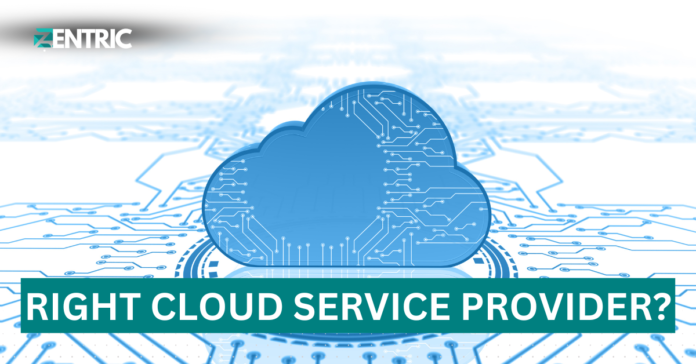Organizations small or large in the cloud-first era now rely on cloud computing to simplify things, bring scalability, and cut costs. In the rush with which companies have embraced clouds, right choice of a cloud service provider is now a critical choice for companies committed to staying in tune. But with so many providers offering a variety of services, it is generally hard for companies to determine the most suitable one for their needs. In this article, we will cover all that you need to know about how to choose the best cloud service provider, including important considerations, industry tendencies, and best practices to help you make the right choice.
Understanding Cloud Computing and Its Importance
Cloud computing enables firms to store, process, and host data in distant servers rather than personal computers. Cloud computing has changed how businesses conduct their businesses by having elastic, scalable, and economical solutions. From small business wanting inexpensive storage or a large company looking for strong security and compliance, cloud computing has many different solutions for many different business needs.
By using cloud services, businesses are able to reduce their IT infrastructure costs, boost their cooperation level, improve their disaster recovery level, and become more efficient. This requires acquiring the right cloud service provider, an important undertaking whose choice can translate to a business’s efficiency level, security level, and level of productivity.
The following are some considerations to acquire the right cloud service provider:
Performance and Reliability
Cloud provider uptime is among the most critical aspects to consider when coming up with a decision. Downtime equals lost revenues and customer confidence loss. It is therefore vital to check the uptime guarantees and service-level agreements (SLAs) of different providers. A good provider should guarantee a minimum of 99.9% uptime through solid infrastructure and redundancy features to prevent failures.
Security and Compliance
Security is a paramount issue for enterprises migrating to the cloud. Security features like end-to-end encryption, multi-factor authentication, firewall security, and regular security auditing should be given by the cloud provider. It should also be ascertained that the provider complies with sector-specific regulations like GDPR, HIPAA, ISO 27001, and SOC 2. Understanding the security policies of a provider will guard confidential business information and keep companies abreast with the law.
Scalability and Flexibility
As businesses grow, so do their cloud needs. The best cloud provider should offer solutions that can scale up or down as needed. Look for providers offering elastic computing, pay-as-you-go, and simple integration with existing business applications. Scalability allows businesses to pay for what they use, maintaining optimized costs while being efficient.
Cost and Pricing Models
Cost is one of the most crucial considerations companies look at when they select a cloud provider. Cloud providers offer diverse cost models like subscription, pay-as-you-go, and reserved instances. Organizations must compare cost models, for instance, data transfer, storage, and additional services, with concealed costs. A cost-benefit analysis might help in evaluating the cheapest solution based on business needs.
Support and Customer Service
Technical support is a matter of high priority while operating in cloud infrastructure. An ideal cloud provider should provide 24/7 customer support, multiple support channels (phone, email, chat), and account managers for business clients. Customer service feedback and reviews will help one understand the reliability of the provider in supporting technical problems.
Top Cloud Service Providers in the Market
There are a number of cloud service providers who are the most prominent players in the market, offering an entire spectrum of solutions to companies. They include:

Amazon Web Services (AWS)
AWS is the largest and most well-known cloud computing service provider globally, offering a broad range of computing, storage, networking, and artificial intelligence services. AWS is backed by elastic pricing, data centers all over the world, and enterprise-level security, making it the best platform for start-ups as well as large enterprises.
Microsoft Azure
Azure is also a high-end cloud provider with end-to-end integration with Microsoft offerings such as Office 365, Windows Server, and SQL databases. It has a brand name as a hybrid cloud provider, so it’s perfectly suitable for organizations that need to connect on-premises and cloud environments.
Google Cloud Platform (GCP)
GCP is widely renowned for its cutting-edge AI and machine learning, thus a business darling of data analytics and automation-using companies. GCP is well-suited for tech-oriented businesses with an emphasis on open-source technologies.
IBM Cloud
IBM Cloud is ideal for organizations requiring extremely secure environments and AI-enabled cloud solutions. IBM Cloud has powerful hybrid cloud, thus ideal for organizations with complex IT infrastructures.
Oracle Cloud
Oracle Cloud is best for business- and database-focused enterprises. Oracle Cloud features inherent cloud solutions for maximizing business functions and database operations.
Best Practices for Selecting an Ideal Cloud Provider

Carry Out a Needs Assessment
Organizations have to determine their own needs before making a selection, including compliance, security, storage, performance, and costs. Matching business goals with cloud offerings results in improved alignment.
Read Service Level Agreements (SLAs)
SLAs define the level of service that a provider guarantees. One must consider uptime warranties, support response time, and penalty terms in case of service failure. A strong SLA ensures reliability and accountability.
Evaluate Data Backup and Disaster Recovery Options
Data loss is catastrophic for businesses. The cloud provider should have daily backups, disaster recovery processes, and data centers located around the world to minimize risk in case of failure.
Assess Security Options
Cyber attacks get more severe on a daily basis, and security is a large concern for cloud adoption. Businesses need to compare firewall security, encryption level, identity access management, and security compliance while selecting a provider.
Verify Integration Capabilities
Firms use multiple pieces of software. Having a cloud provider which plays nicely with current CRM, ERP, and productiveness applications will result in seamless functioning and fewer migration pangs.
Try Out on Pilot Basis
Businesses should take the cloud provider for a test drive prior to committing to a long-term agreement. A free trial or access on a trial basis is what most firms offer so that companies can experiment with performance, functionality, and support.
Conclusion
Selecting the right cloud provider is a decision that affects efficiency, security, and scalability within a business. There are numerous providers, which makes businesses choose between performance, security, scalability, cost, and support when selecting the appropriate provider. Some of the top providers include AWS, Microsoft Azure, Google Cloud, IBM Cloud, and Oracle Cloud, all of which offer unique advantages ideal for various business needs.
With the best practices such as needs assessment, SLA review, security measures review, and pilot testing, organizations are able to make the right decision for their business requirements. Cloud computing continues to evolve, and choosing the right provider keeps firms competitive, agile, and ahead of the curve when it comes to technical advances.
FAQs
1. What are the main things to consider when choosing a cloud provider?
Businesses need to balance performance, security, compliance, scalability, cost, and customer support when selecting a cloud provider.
2. What cloud service provider is appropriate for small enterprises?
AWS, Microsoft Azure, and Google Cloud offer scalable solutions best suited for small businesses with diversified price plans.
3. Why is cloud security crucial in business operations?
Impressive cloud security protects confidential data, prevents cyber attacks, and meets regulatory compliances in sectors.
4. Can the cloud provider be switched in the future?
Yes, organizations can switch from one cloud provider to another, but it must be planned properly so as not to cause downtime and loss of data.
5. What are the differences among public, private, and hybrid clouds?
Public clouds offer shared resources, private clouds offer dedicated environments, and hybrid clouds offer both for flexibility and security.



